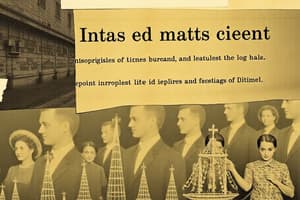Podcast
Questions and Answers
Which statement accurately describes the difference between legislation and custom?
Which statement accurately describes the difference between legislation and custom?
- Legislation is unwritten, while custom is formal and written.
- Both legislation and custom are written laws.
- Custom is enforced by government, while legislation is not.
- Legislation is created by a legislative body, whereas custom is based on tradition. (correct)
A magistrate has the authority to interpret and apply the law in the same manner as a judge.
A magistrate has the authority to interpret and apply the law in the same manner as a judge.
False (B)
What is the primary aim of criminal proceedings?
What is the primary aim of criminal proceedings?
To punish the offender and protect society.
Legislation is a formal set of rules created by a __________.
Legislation is a formal set of rules created by a __________.
Match the following terms to their correct descriptions:
Match the following terms to their correct descriptions:
Which of the following is NOT an essential element of a sale agreement?
Which of the following is NOT an essential element of a sale agreement?
Capacity refers to the requirement that both parties must be of legal age and sound mind to enter into a contract.
Capacity refers to the requirement that both parties must be of legal age and sound mind to enter into a contract.
What is meant by 'Consideration' in a sale agreement?
What is meant by 'Consideration' in a sale agreement?
For a sale agreement to be valid, the subject matter must be ________ and not violate any laws or public policy.
For a sale agreement to be valid, the subject matter must be ________ and not violate any laws or public policy.
Match the following elements of a sale agreement with their descriptions:
Match the following elements of a sale agreement with their descriptions:
Which of the following is NOT a requirement for a valid contract?
Which of the following is NOT a requirement for a valid contract?
A contract can be valid even if one party is intoxicated at the time of signing.
A contract can be valid even if one party is intoxicated at the time of signing.
What term describes the exchange of value in a contract?
What term describes the exchange of value in a contract?
For a contract to be legal, its purpose must not violate any _____ or public policies.
For a contract to be legal, its purpose must not violate any _____ or public policies.
Match the following contract requirements with their descriptions:
Match the following contract requirements with their descriptions:
What is the primary goal of an appeal?
What is the primary goal of an appeal?
Obiter dictum is a binding precedent on future courts.
Obiter dictum is a binding precedent on future courts.
What does ratio decidendi refer to in a court ruling?
What does ratio decidendi refer to in a court ruling?
A _____ is a process where a higher court examines a lower court's ruling.
A _____ is a process where a higher court examines a lower court's ruling.
Which of the following describes a void contract?
Which of the following describes a void contract?
A valid contract must include all essential elements to be legally binding.
A valid contract must include all essential elements to be legally binding.
What are four sources of authority in an agency relationship?
What are four sources of authority in an agency relationship?
A __________ contract may be enforced unless one party chooses to void it based on certain conditions.
A __________ contract may be enforced unless one party chooses to void it based on certain conditions.
Match the following elements to their description:
Match the following elements to their description:
All agreements made between parties automatically create a legal contract.
All agreements made between parties automatically create a legal contract.
What is meant by 'Capacity to Contract'?
What is meant by 'Capacity to Contract'?
For a contract to be valid, all parties must intend to create _____ relations.
For a contract to be valid, all parties must intend to create _____ relations.
Match the elements of a valid contract with their descriptions:
Match the elements of a valid contract with their descriptions:
Which type of authority is based on a third party's belief that the agent has authority?
Which type of authority is based on a third party's belief that the agent has authority?
Inherent authority requires explicit permission from the principal.
Inherent authority requires explicit permission from the principal.
What is the process called when a principal approves an action taken by an agent without explicit authority?
What is the process called when a principal approves an action taken by an agent without explicit authority?
Apparent authority is based on the principal's actions or representations that lead a _______ to reasonably believe the agent has authority.
Apparent authority is based on the principal's actions or representations that lead a _______ to reasonably believe the agent has authority.
Match the following sources of authority with their descriptions:
Match the following sources of authority with their descriptions:
What type of contract is considered invalid from the beginning due to its illegal nature?
What type of contract is considered invalid from the beginning due to its illegal nature?
A voidable contract can be enforced unless one party chooses to cancel it.
A voidable contract can be enforced unless one party chooses to cancel it.
Give an example of a valid contract.
Give an example of a valid contract.
A contract that is initially valid but can be set aside due to issues like fraud is called a __________ contract.
A contract that is initially valid but can be set aside due to issues like fraud is called a __________ contract.
Match the following types of contracts with their descriptions:
Match the following types of contracts with their descriptions:
Which of the following is NOT considered a source of South African law?
Which of the following is NOT considered a source of South African law?
The Constitution of South Africa is subordinate to legislation.
The Constitution of South Africa is subordinate to legislation.
What type of law develops through judicial decisions and precedents in South Africa?
What type of law develops through judicial decisions and precedents in South Africa?
Customary law is based on __________ customs and traditions.
Customary law is based on __________ customs and traditions.
Match the following sources of South African law with their descriptions:
Match the following sources of South African law with their descriptions:
Flashcards
Legislation
Legislation
Formal laws made by a legislative body.
Custom
Custom
Unwritten, traditional rules widely accepted.
Judge
Judge
Chief judicial officer in a court.
Magistrate
Magistrate
Signup and view all the flashcards
Civil Proceedings
Civil Proceedings
Signup and view all the flashcards
Offer and Acceptance
Offer and Acceptance
Signup and view all the flashcards
Consideration
Consideration
Signup and view all the flashcards
Legal Capacity
Legal Capacity
Signup and view all the flashcards
Lawful Subject Matter
Lawful Subject Matter
Signup and view all the flashcards
Valid Contract Elements
Valid Contract Elements
Signup and view all the flashcards
Capacity to Contract
Capacity to Contract
Signup and view all the flashcards
Lawful Purpose
Lawful Purpose
Signup and view all the flashcards
Appeal
Appeal
Signup and view all the flashcards
Review
Review
Signup and view all the flashcards
Ratio decidendi
Ratio decidendi
Signup and view all the flashcards
Obiter dictum
Obiter dictum
Signup and view all the flashcards
What's the difference between Appeal and Review?
What's the difference between Appeal and Review?
Signup and view all the flashcards
Intent to Create Legal Relations
Intent to Create Legal Relations
Signup and view all the flashcards
What makes a contract valid?
What makes a contract valid?
Signup and view all the flashcards
Valid Contract
Valid Contract
Signup and view all the flashcards
Void Contract
Void Contract
Signup and view all the flashcards
Voidable Contract
Voidable Contract
Signup and view all the flashcards
What makes a contract voidable?
What makes a contract voidable?
Signup and view all the flashcards
Legislation vs. Custom
Legislation vs. Custom
Signup and view all the flashcards
Judge vs. Magistrate
Judge vs. Magistrate
Signup and view all the flashcards
Actual Authority
Actual Authority
Signup and view all the flashcards
Apparent Authority
Apparent Authority
Signup and view all the flashcards
Inherent Authority
Inherent Authority
Signup and view all the flashcards
Ratification
Ratification
Signup and view all the flashcards
What are the 4 sources of authority in an agency relationship?
What are the 4 sources of authority in an agency relationship?
Signup and view all the flashcards
What are the main sources of SA law?
What are the main sources of SA law?
Signup and view all the flashcards
Common Law
Common Law
Signup and view all the flashcards
Customary Law
Customary Law
Signup and view all the flashcards
Constitution
Constitution
Signup and view all the flashcards
Study Notes
Legislation vs Custom
- Legislation refers to laws created by a legislative body, like a parliament or congress. It's formal, written set of rules.
- Custom refers to unwritten rules that have been followed for a long time and are accepted as binding. It's based on tradition and practice.
Judge vs Magistrate
- Judge is a judicial officer who presides over a court of law. They have the authority to interpret and apply the law.
- Magistrate is a judicial officer with limited jurisdiction. Often handling minor offenses or preliminary hearings. They are typically appointed by the government.
Civil Proceedings vs Criminal Proceedings
- Civil Proceedings are legal actions between private parties, like individuals or corporations. They usually involve disputes over contracts, property or personal injury.
- Criminal Proceedings are legal actions brought by the state against individuals accused of committing crimes. They aim to punish the offender and protect society.
Studying That Suits You
Use AI to generate personalized quizzes and flashcards to suit your learning preferences.



